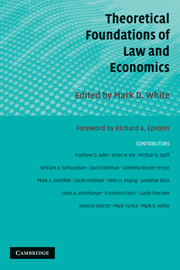Book contents
- Frontmatter
- Contents
- Foreword
- Preface
- Notes on Contributors
- PART ONE THE ROLE AND USE OF ECONOMICS IN LEGAL STUDIES
- PART TWO EFFICIENCY
- PART THREE RATIONALITY AND THE LAW
- PART FOUR VALUES AND ETHICS IN CIVIL AND CRIMINAL LAW
- 11 Law and Economics and Explanation in Contract Law
- 12 Welfare, Autonomy, and Contractual Freedom
- 13 Efficiency, Fairness, and the Economic Analysis of Tort Law
- 14 Retributivism in a World of Scarcity
- Index
- References
12 - Welfare, Autonomy, and Contractual Freedom
Published online by Cambridge University Press: 06 July 2009
- Frontmatter
- Contents
- Foreword
- Preface
- Notes on Contributors
- PART ONE THE ROLE AND USE OF ECONOMICS IN LEGAL STUDIES
- PART TWO EFFICIENCY
- PART THREE RATIONALITY AND THE LAW
- PART FOUR VALUES AND ETHICS IN CIVIL AND CRIMINAL LAW
- 11 Law and Economics and Explanation in Contract Law
- 12 Welfare, Autonomy, and Contractual Freedom
- 13 Efficiency, Fairness, and the Economic Analysis of Tort Law
- 14 Retributivism in a World of Scarcity
- Index
- References
Summary
Advocates of contractual freedom typically use either welfarist or autonomy-based arguments. Also typical is their shared belief that welfarism and autonomy-based theories are both fundamentally distinct and divergent in their policy implications. The welfarist argument rests on proofs that a perfectly competitive market is Pareto-efficient (henceforth, efficient), that is, no one can be made better off without worsening someone. Because, by definition, a market is a network of voluntary exchanges, the welfarist case for perfectly competitive markets is simultaneously a case for contractual freedom. The autonomy-based argument holds that by freely controlling their legitimate holdings, individuals exercise their autonomy, that is, their ability to pursue life plans of their own. This line of thought sees contracts as legal devices to express unanimous consent to new allocations of resources. Unlike hedonistic utilitarianism, which demands the sacrifice of persons for the sake of aggregate happiness, the autonomy-based argument insists on the moral separateness of persons, both as sources and as pursuers of life plans.
I argue in this chapter that both welfarist and autonomy-based considerations support a strong presumption of contractual freedom. I will call this the convergence thesis. The presumption asserted by the convergence thesis is strong enough to exclude invalidation of contracts for reasons other than the classical defenses of fraud, mistake, duress, and necessity. I further contend that the convergence thesis is in turn grounded in a more fundamental commitment to contractual freedom itself (the contractarian thesis).
- Type
- Chapter
- Information
- Theoretical Foundations of Law and Economics , pp. 214 - 233Publisher: Cambridge University PressPrint publication year: 2008
References
- 4
- Cited by



